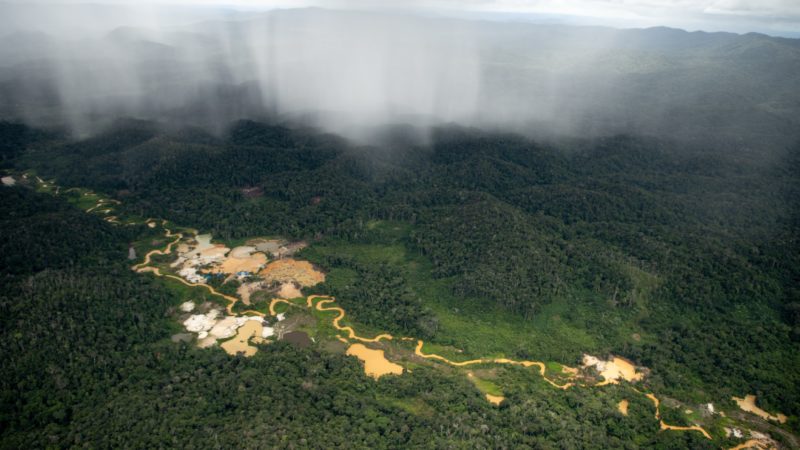Illegal mining in Yanomami Territory. Credit: ISA
An outburst of violent attacks by illegal gold miners in the northern Brazilian Amazon has injured several and taken the lives of two Yanomami children, aged one and five.
The children fled into the forest when gold miners fired automatic weapons at them and other community members from their boats on May 10th. The children’s bodies were found floating in the Uraricoera River two days later, according to a statement by the Hutukara Yanomami Association.
The killings are but one more tragic chapter in the ongoing and newly-intensifying struggle between the Yanomami and the illegal gold miners (known as “garimpeiros,”) who for decades have sought to enrich themselves on Yanomami territory.
The rifle fire and ensuing panic occurred near the village of Palimiu, where several violent altercations have taken place of late, and where there is no sign that the loss of innocent life has chastened the illegal trespassers. Only one day later, on May 11th, garimpeiros opened fire on federal police; on May 16th, they lobbed tear gas bombs at the villagers.
Who are the Yanomami, and Why are They Attacked?
Garimpeiro violence has plagued the Yanomami for more than 30 years. Between the 1980s and 1990s, the Yanomami were frequently targeted and murdered by illegal miners, most notably in the ghastly Haximu Massacre, during which miners ambushed a village and killed 16 inhabitants, decapitating eight children in the process.

After a period of relative calm that lasted several years, violence and confrontation has once again escalated following the 2018 election of hard right president Jair Bolsonaro, who has steadily disempowered Funai (the Brazilian federal governmental agency responsible for protecting indigenous peoples) and has repeatedly stated support for resource extraction businesses at the detriment of environmental protection and indigenous land rights. Emboldened by the administration, miners have expanded their corrosive footprint on Yanomami land. In 2020, deforestation on Yanomami territory was up 26%, with more than 1,200 acres of primary rainforest cut down. With the miners advancing, Yanomami bloodshed and hardship has increased: last year, miners fatally shotgunned two Yanomami, and COVID-19, malaria, and hunger have afflicted the Yanomami community—the direct result of garimpeiro encroachment and deforestation.
Located in the northern states of Amazonas and Roraima, the Yanomami Indigenous Territory covers over 37,000 square miles, making it larger than Portugal and the largest forested indigenous territory on Earth. But the territory is sparsely populated—there are only 27,000 Yanomami on the Brazil side of the border—making surveillance for illegal trespassers and deforestation a logistical challenge. And with an estimated 20,000 illegal miners on the territory, the Yanomami are in danger of being overpowered by a group with no legal or ethical justification for land tenure—echoing the historical atrocity of colonialism.
What is Rainforest Foundation US Doing to Fight Illegal Gold Miners?
In northern Brazil, the terror and destruction beset by gold prospectors is—sadly—not unique to the Yanomami. But there is hope. Rainforest Foundation US is establishing a community monitoring program with communities in nearby Raposa Serra do Sol, where indigenous community members are being trained and equipped with smartphone technology to detect deforestation quickly, allowing them to more efficiently monitor their expansive territory and expel invaders more quickly. A similar program in Peru has shown extremely promising initial results.
RFUS is a long standing partner of the Hutukara Yanomami Association. We provided capacity strengthening for the organization during its 2004 launch, and helped secure a vehicle for Yanomami leadership—an integral protective measure at a time of escalating, targeted violence. Since the start of the COVID-19 pandemic, we’ve worked closely with the association in their efforts to expel the miners, and have helped them secure personal protective equipment (PPE) to better stop the spread of the virus.
Support the Yanomami by signing a petition on their behalf, or donate directly to the Hutukara Yanomami Association here.








